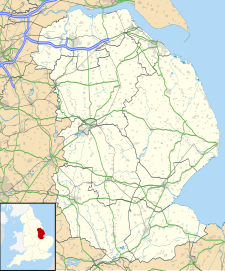Scunthorpe General Hospital
| Scunthorpe General Hospital | |
|---|---|
| Northern Lincolnshire and Goole Hospitals NHS Foundation Trust | |

Rear of the hospital
|
|
| Geography | |
| Location | Cliff Gardens, Scunthorpe, North Lincolnshire, DN15 7BH, United Kingdom |
| Coordinates | 53°35′13″N 0°40′01″W / 53.587°N 0.667°WCoordinates: 53°35′13″N 0°40′01″W / 53.587°N 0.667°W |
| Organisation | |
| Care system | Public NHS |
| Funding | Government hospital |
| Hospital type | District General |
| Affiliated university | NHS North Lincolnshire |
| Services | |
| Emergency department | Yes Accident & Emergency |
| Beds | 408 |
| History | |
| Founded | 1929 |
| Links | |
| Website | NHS Directory |
| Lists | Hospitals in the United Kingdom |
Scunthorpe General Hospital is the main hospital for North Lincolnshire. It is situated on Church Lane in the west of Scunthorpe, off Kingsway (A18), and north of the railway. A & E is at the far north of the site, accessed via Highfield Avenue, off Doncaster Road (A1029). As well as North Lincolnshire, it also serves Gainsborough.
In the 1850s when the steel industry was forming, if there were serious accidents at work, men were taken by horse and cart to the ferry at New Holland and then on to Hull. In the late 1800s makeshift facilities were set up in Frodingham Town Hall.
After the First World War, the need for a hospital became increasingly urgent when the town increased in size after the Appleby-Frodingham Steel Company was formed. Rowland Winn, 2nd Baron St Oswald, who had owned land on which the steelworks were built, donated land off Doncaster Road for a hospital to be built.
In the late 1920s, at long last, work gathered pace to build a hospital. Subscriptions from local workmen were collected and local fundraising took place. Each year there was the Annual Hospital Carnival. The Scunthorpe and District War Memorial Hospital opened on 5 December 1929. It cost £65,000 and had 72 beds. For the first year, the running of the hospital cost around £13,000. By 1931 the beds increased to 86 and X-ray equipment was installed. On 26 October 1933 the nurses home was opened by Prince George, Duke of Kent, costing £15,000, with training facilities recognised by the General Nursing Council for England and Wales.
In 1935 it increased to 130 beds, with wards named after Appleby Frodingham, Lysaght's, Redbourn, Firth Brown and Winn – the local steel companies, who were funding half the hospital's costs. In-patients cost 7s 5d per day. Further expansion, including the outpatients, was planned in mid-1939, and completed in 1942, being opened on 15 July 1942 by Ernest Brown, the Minister of Health, and cost £110,000. The hospital now had 204 beds, with an annual cost of £54,000.
...
Wikipedia

